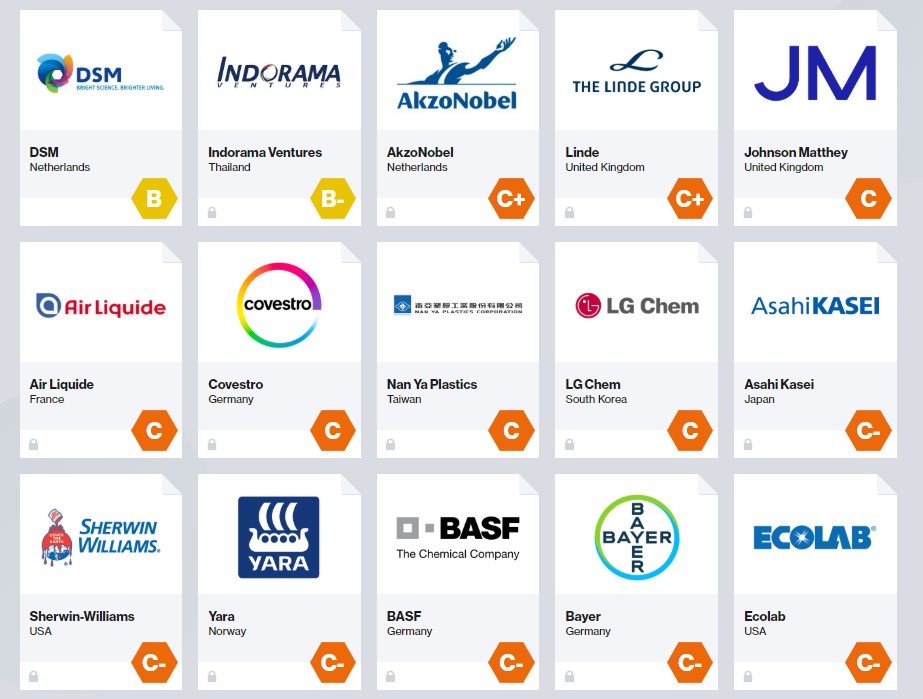ChemScore is a corporate benchmark tool – released today by the environmental NGO ChemSec – that looks at the level of sustainability in the product portfolio of the 35 biggest players in the chemical industry. ChemScore aims to capture and rank the world’s largest chemical companies’ efforts to reduce their production of hazardous chemicals, and to boost investments in safer, greener alternatives. Dutch chemical companies DSM and AkzoNobel have the highest and third highest scores in the ranking.
Over 70% of all chemicals used and manufactured in Europe are hazardous to human health and/or the environment, according to Eurostat. Despite this, investors and other stakeholders have very little information about the companies involvement in the production and use of these chemicals.
“For investors, a better understanding of companies’ involvement in hazardous chemical production is crucial. Many of these chemicals not only pose a threat to human health and the environment, they also threaten the return of an investment”, says Anne-Sofie Bäckar, Executive Director at ChemSec.
Persistent chemicals, such as PFAS, are an illustrative example. These chemicals have been building up in humans and nature over decades and the levels are now critical at many places around the world. In the US, several chemical companies producing such substances are now facing litigation with estimated costs ranging from USD 25 billion to USD 40 billion.
“It’s not a coincidence that their stock prices have taken a nosedive compared to the industry average”, comments Anne-Sofie Bäckar.
About the ranking
Through ChemScore, investors are shown the best and worst performers in the chemical industry. The 35 largest stock-listed chemical companies (based on their 2018 revenue) are ranked in four different categories.
- Hazardous Product Portfolio – each company’s total production of hazardous chemicals, weighted on the basis of the company’s total revenue. Lower production of hazardous chemicals gives a higher category score.
- Development of Safer Chemicals – the strategy towards safer products, including design stage, marketing of safer products, R&D and green chemistry.
- Management & Transparency – the companies’ transparency with product ingredients, and public commitments to phase out certain substances.
- Controversies – the companies’ track record of accidents and controversies such as fines and liability cases.
Top performer in this year’s ChemScore is Dutch chemical company DSM.
“I’m very proud that DSM has topped the ChemScore ranking. This resonates strongly with DSM Resins & Functional Materials’ ambition to phase out all chemicals of high concern from our finished products by 2025. This ranking reflects the importance of chemical safety as one of the many aspects of sustainability. Chemical safety is taken very seriously by our industry and this ranking encourages us to maintain our focus on this topic. Moving forward, we must work together to accelerate the sustainable transformation of our industry and create brighter lives for all!”, comments Helen Mets, Executive Vice-President of DSM Materials.
ChemScore has been developed with input from chemical industry representatives. It has also consulted the investment community, including Aviva Investors, a global asset manager with £346 billion in assets under management.
“Understanding which companies are leading on sustainable management of chemicals, or lagging behind their peers, is a very important part of the larger sustainability puzzle and we are proud to take the lead in this issue within the investment community. ChemScore broadens our understanding of how companies are managing the risks involved in manufacturing chemicals. These include litigation, lack of preparation for new regulation and reputational risk. ChemScore also gives us valuable insight into how we can encourage companies to improve”, says Eugenie Mathieu, Senior ESG Analyst with Aviva Investors.
Facts & figures from the ranking
- Dutch chemical companies DSM and AkzoNobel have the highest and third highest scores in the ranking.
- In general, European companies perform the best.
- None of the 35 companies fully disclose what kind of chemicals they produce in regions outside of the EU and US (where regulation forces them to disclose it).
- Only three companies score more than ten points (out of 18) in the category that looks at the hazardous chemicals in the companies’ portfolios. These are Linde, Air Liquide (both gas companies) and Indorama Ventures (produces mainly polyester).
- Three companies score 0 points in this category, indicating that they have portfolios full of toxic chemicals.
- Four companies are ahead of the rest when it comes to green chemistry and development of safer chemicals: DSM, AkzoNobel, Sherwin-Williams and LG Chem.
- 14 of the companies produce persistent chemicals. While still flying under the regulatory radar in many regions, these chemicals have proven to be problematic as the levels build up in nature and humans over time.
- All companies have been given a seven-week window to give feedback on their respective score to potentially raise it. 18 of the 35 companies replied.
View the ranking here



